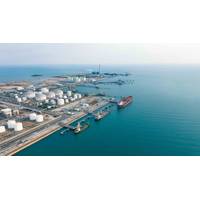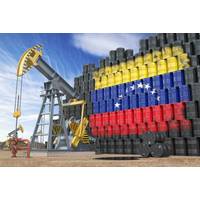Tengiz Oilfield Power Facility Fires Damage Kazakhstan's CPC Oil Exports

Kazakhstan's planned oil exports could fall by as much as 35% this month via its main route through Russia, four trading sources have told Reuters, as the giant Tengiz oilfield slowly recovers from fires at power facilities in January.U.S. oil major Chevron leads the Tengizchevroil (TCO) consortium that operates the field.Oil exports through the Caspian Pipeline Consortium system, which crosses into Russia en route to the Black Sea, could drop from the preliminary schedule of about 1.7 million barrels per day (bpd) to around 1.1 million bpd if the production recovery at Tengiz continues at a sluggish pace…
Chevron to Boost Exports of Venezuelan Oil to US in March

Oil producer Chevron is set to boost exports of Venezuelan crude to the U.S. to some 300,000 barrels per day (bpd) in March, from 100,000 bpd in December and some 230,000 bpd so far this month, two sources with knowledge of the plans said on Wednesday.The U.S. company, which is the main partner of Venezuela's state-run energy firm PDVSA, has chartered about a dozen tankers to increase shipments and drain inventories accumulated at its projects since December, when a U.S. blockade hit the OPEC country's exports…
Venezuelan Oil Exports Progress Slowly Under US Supply Deal

Venezuelan oil exports under a flagship $2 billion supply deal with the U.S. reached about 7.8 million barrels on Wednesday, vessel-tracking data and documents from state-run PDVSA showed, with shipments accelerating after the U.S. eased its blockade but not enough for PDVSA to fully reverse output cuts.Following the U.S. capture of President Nicolas Maduro in early January, Caracas and Washington agreed to a deal to sell up to 50 million barrels of Venezuelan crude stored in tanks and vessels. Trading houses Vitol and Trafigura obtained the first U.S.
Kazakhstan CPC Oil Exports Struggle After Tengiz Field Shutdown

Kazakhstan's CPC oil exports could remain restricted even as extensive maintenance on its primary oil export route wraps up, sources said on Wednesday, with force majeure declared at the country's largest oilfield, Tengiz, following a fire.The CPC terminal, which handles about 1.5% of global oil supply and 80% of Kazakhstan's crude exports, has been operating below capacity since mid-November.Maintenance work on Single Point Mooring-3 (SPM-3) at CPC's Russian Black Sea terminal is in its final stages…
Venezuela Reopens Wells as Exports Resume

Venezuela's state oil company has begun reopening some of the wells it and its joint venture partners had shut amid a strict U.S. embargo, as crude exports resume with two shipments departed on Monday, three sources close to operations said.The OPEC country's oil exports had remained almost at a standstill since December, with only U.S. Chevron exporting crude from its joint ventures under a U.S.
Russian Oil Exporters Struggle to Stay Afloat as Discounts Deepen

Discounts on Russian oil at export terminals have once again approached historic highs, putting pressure on exporters' trade profits amid weak global oil prices, Reuters calculations show.Western sanctions over Russia's military action in Ukraine have forced its oil companies to sell crude at steep discounts, reaching $20 to $30 per barrel below Brent in December - the widest gap at Russian ports since early 2022, Reuters data indicates.The deeper discounts have eroded margins, pushing some suppliers into losses.
Russian Oil Exports Remain Stable Despite Recent Sanctions

Russia has maintained a steady pace of oil shipments from its sea ports at the start of November despite fresh U.S. sanctions imposed on the country's largest oil companies, traders said and LSEG data shows.The United States last week introduced sanctions against Russia's two biggest oil producers, Lukoil and Rosneft. These are the first direct sanctions on Russia imposed by U.S.
Bulgaria Temporarily Bans Fuel Exports to EU Following Lukoil Sanctions

Bulgaria's parliament temporarily banned on Friday exports of some fuels, mainly diesel and aviation fuel, to EU member states to ensure the stability of the local market following U.S. sanctions on Russia's Lukoil, which runs the country's biggest oil refinery.Last week, Bulgaria announced it would take measures to secure uninterrupted supplies of oil and oil derivatives after the U.S.
Russia Revises Oil Exports from Ust-Luga, Novorossiisk Ports

Russia has increased its planned oil loadings from the Baltic port of Ust-Luga and the Black Sea port of Novorossiisk for September, following disruptions at its main western outlet, Primorsk, two sources familiar with the schedule told Reuters.The diversion of oil flows to less affected western ports may help Russia keep overall exports relatively stable despite infrastructure damage. Moscow is making an effort to maintain high oil sales, which remain the backbone of its budget revenue.The increase in seaborne exports also comes amid unplanned shutdowns at several Russian refineries…
Nigerian President Lifts Emergency Rule, Resuming Crude Exports

Nigerian President Bola Tinubu on Wednesday lifted a six-month emergency rule in Rivers State, reinstating Governor Siminalayi Fubara and other officials, after saying that a constitutional crisis that had paralysed governance had been resolved.The emergency rule, imposed on March 18, followed a standoff between Fubara and the state legislature that disrupted budget approvals and left the government in limbo. Tinubu said the measure was necessary to prevent anarchy.Rivers State, located in the oil-producing Niger Delta, is an important hub for Nigeria's crude exports.
Kazakhstan Resumes Baku-Tbilisi-Ceyhan Pipeline Exports After Contamination Issues

Kazakhstan resumed oil supplies via the Baku-Tbilisi-Ceyhan pipeline on September 13, state energy company Kazmunaygaz said on Wednesday.Supplies via the route were suspended last month amid contamination issues.The BTC pipeline, which runs through Georgia to Turkey, is used mainly to export oil from the Azeri, Chirag and Guneshli oilfields, which are operated by BP.The pipeline is also used by Kazakhstan as a way to lessen its dependence on Russia as a main exporting route. More than 80% of…
Poland Urges EU Members to End Russian Oil Imports by 2026

Poland has urged European Union member states that are still buying Russian energy to end those imports by the end of 2026 and will offer them help towards that effort, Energy Minister Milosz Motyka said on Wednesday.The Druzhba oil pipeline delivers Russian oil to Hungary and Slovakia, which continue to buy energy supplies from Russia after other EU nations cut ties following Russia's full-scale invasion of Ukraine in 2022.The European Commission will propose speeding up the phasing out of Russian fossil imports, the EU executive head Ursula von der Leyen said on Tuesday after a call with U.S.
Russia to Increase Oil Exports After Drone Strikes Shut Refineries

Russia plans to increase exports from its western ports to nearly two million barrels per day in August, about 200,000 bpd more than a previous estimate, after two refineries cut runs following Ukrainian drone attacks, two industry sources said.The extra oil has the potential to add to downward pressure to the global oil market as supplies are already set to be increased by an output hike agreed on Sunday by OPEC+, the Organization of the Petroleum Exporting Countries and allies, including Russia.The Ryazan and Novokuibyshevsk refineries…
Venezuelan Oil Exports Declined in July as Partners Awaited US Authorizations

Venezuela's oil exports declined about 10% in July from the previous month as key partners of state company PDVSA awaited U.S. authorizations to expand operations in the country, according to vessel tracking data and company documents.Washington in late July green lit producer Chevron to operate in the sanctioned country and export its crude to the U.S. under a restricted license that does not allow any payment to Venezuelan President Nicolas Maduro's administration.Other PDVSA partners are still…
China Ramps Up Refined Fuel Exports As Profit Margins Rise

China's exports of key refined fuels are on track to jump to the highest in 16 months as refiners take advantage of rising profit margins.Shipments in July of middle and light distillates, which include diesel and gasoline, are forecast to reach 26.63 million barrels, or 859,000 barrels per day, data compiled by commodity analysts Kpler shows.This figure is up from 796,000 bpd in June and the highest since the 1.06 million bpd in March 2024, the data shows.China's refiners have substantial spare…
Daily Oil Exports From Russia's Western Ports Will Drop 8% in August

Russia's daily oil exports from its western ports are set to be around 1.77 million barrels per day (bpd) in August, down from 1.93 million bpd in July's plan, amid the expected rise in refinery runs, Reuters calculations based on data from two sources show.On a daily basis oil loadings from Russia's Primorsk, Novorossiisk and Ust-Luga including Urals, Kazakh KEBCO and Siberian Light oil grades will decline some 8% in August from the current month.Russia's offline primary oil refining capacity…
Russian FSB Allow Foreign Tankers to Access Black Sea Ports; Kazakh Oil Exports Resume

Russia's FSB security service has started handing out clearance for foreign tankers to access the Black Sea ports, allowing for Kazakhstan's oil exports to resume after they were halted for nearly a day, four industry sources said on Thursday.The suspension led to the disruption of around 2% of global supply and drove international oil prices to almost $70 a barrel on Thursday before they pared gains. Russian regulations mean foreign ships require the approval of Russia's FSB security service…